- Home
- Derek Ciccone
(2012) Officer Jones Page 6
(2012) Officer Jones Read online
Page 6
He gripped the gun as the door swung open. But nobody was there. Then a voice rose up from below, “Are you Kyle? My mom said to tell you she’d be with you in just a minute.”
He looked down to see a little girl—a miniature version of Lucy with the same dark curls. He hadn’t counted on this. An image of his parents flashed in his mind, followed by the same pain he felt when he lost them. He now understood the source of his apprehension. He misread the voice. He couldn’t allow this girl to grow up with that pain.
“I’m sorry, I have the wrong house,” he replied in a low voice, and ran as fast as he could up the street, until he reached his rental car.
He drove directly to the airport and boarded the next flight home. He had no fear of being traced—he was using the identity of Grady Benson, who had been Kyle Jones’ old Air Force wingman.
He picked up an extra shift on Saturday night. His presence was welcome, due to so many officers being assigned to work the Rockfield Fair during the Labor Day weekend. While on patrol, he tried to make sense of his failed journey. His missions had always been so clear, and brought such a feeling of peace, that this was uncharted territory for him. But he still felt a strong call-to-action hanging over him. Completing his business with Lucy on this anniversary had made sense, but now for the first time since his journey began, he felt unsure.
But later that night, he received a radio message about an accident on the Samerauk Bridge. When he arrived at the scene, he found that it was no accident. And later, in the hospital, as he comforted the mother of the murdered girl, his mission again became clear.
Chapter 17
Norfolk, Virginia
September 1—present
The military plane scraped its wheels on the runway, landing me on home soil. A short time later, I stepped onto the tarmac, breathing in the crisp dawn air. I thought of performing the freed-hostage ritual of kissing the ground upon my return, but while that would be right up the attention-grabbing alley of J-News, it was JP who was the one who’d just returned from the European vacation from hell.
I struggled to walk with my cane, which besides a few cuts and bruises was the only visible evidence that I was any the worse for wear. I was met with a relieved smile and hug from my father, Peter Warner. He was thinner than the last time I’d seen him, but still had the same stocky frame and roundish face. It was a look passed on to my brother Ethan, the opposite of the lanky, long-jawed look that my brother Noah and I inherited from my mother’s side.
While I can often be a polarizing repellent, my father’s natural instinct had always been to pull people together, and he thrived on being the leader. I thought of this as I watched him shake hands with all the military personnel like he was running for office. He did hold political office for twenty-five years as Rockfield’s First Selectman. He knew everybody in the town, and everyone knew Peter Warner. He stepped down two years ago when he was diagnosed with prostate cancer, which so far he’d treated like his political opponents—he’s winning in a landslide.
My mother, Sandra Warner, also met me at the airport, but not with the same enthusiasm. She gave me the brief hug of a stranger, followed by deafening silence. Her passive-aggressive protest wasn’t very subtle. For years she’s questioned why they paid for my Columbia education, only for me to repay them by making a foolish and dangerous career choices. The silent-treatment was a new weapon in this ongoing battle. She was mysteriously absent whenever my father called me at Landstuhl, either babysitting Ethan’s kids, or at an event at her historical society—excuses that even Lauren Bowden could have seen through. I understood the grief I’d caused her, but that being said, I really could have used a hug from Mom.
After deplaning, Carter and I bid each other adieu—no hugs, just a manly handshake. I attempted to thank him for all the years by my side in the face of danger, but he mocked my retirement plans with a laugh. “Just get better quick, so we can blow open this Kingsbury case. Go to this Rock place and get that broad from high school out of your head, then you’ll be the old JP again.”
The “old JP” had a nice ring to it, even if it wasn’t what Carter had in mind.
We left Norfolk in a convoy, bypassing the horde of media, and headed northbound on I-95. As the morning sun began to appear in the east, we barreled up the coast, and out of habit I checked my phone messages. A mistake. There were angry ones from Lauren—something about being contractually obligated to be interviewed by her—ass kissing tangents from Sutcliffe, and one from Christina that breezed over the whole “glad you’re not dead” thing, before complaining about the wall of media camped outside the brownstone, trapping her inside. She actually had the nerve to describe it as a “hostage situation.” I erased them all in the spirit of a new beginning.
That spirit turned to reality when I saw the wooden sign that read: Rockfield Connecticut: Incorporated 1756. With a father who was the town’s biggest promoter, and a mother who headed the historical society, I knew all there was to know about Rockfield, both past and present. But I felt like I was seeing it for the first time.
We arrived at a familiar crossroads. Continuing straight on Main Street would take us to the Warner family home. It was the longer route, but also safer. The faster option was the curvy, mountainous drive of Zycko Hill Road, nicknamed Psycho Hill. It was convenient that it rhymed with Zycko, but the name really derived from the infamy associated with the many drivers it had felled over the years, including Noah Warner.
The convoy chose the conservative route. After a few slow miles of country driving, we took a right off Main onto Skyview Drive. The gradual rise of the road provided a breathtaking view of the countryside, which was dotted with farms and church steeples. I observed the children playing along the road, and for a brief moment I felt as if I’d traveled back in time. I could picture playing wiffle ball or kick-the-can with my brother Ethan and our friends, or riding bikes with Gwen. And I could still smell the summer barbecues.
When we arrived at the steep driveway that led to the house my parents had lived in for the past forty years, I was slapped back to reality. The bottom entrance was being guarded by a crowd of media, armed with a small battalion of news vans and satellite trucks. It gave me a flashback to when I returned home after Noah’s accident. At that time, I wasn’t sure that this place would ever feel the same again. Admitting that I’m wrong had never been my strength, but in this case I’m glad that I was.
The military escort showed no intention of stopping, and the media gave way. I smiled—it was good to be on the other side for once.
“Hey, Warner, suddenly you’re camera shy?” shouted a reporter as we sped by. My inner J-News wanted to get out and introduce him to my cane, but JP just kept smiling as the vehicles came to a stop in front of the house.
I took a long look at the cozy A-frame that I grew up in, and then glanced back at the pack of media. I could feel the “JP versus J-News” battle raging inside me, but for the first time I felt that JP might have a chance to win the war.
Chapter 18
That afternoon, Rockfield Police Chief Rich Tolland was called over.
No introduction was necessary, since I’d known Rich since we were in diapers. But when we greeted each other, I felt like I was meeting him for the first time.
Rich then revealed the main purpose for his visit—me, and the circus I’d brought to town. He’d assigned two officers at the bottom of the driveway to disperse the crowds. He referred to them as “those damn bloodsuckers.” He must have then remembered that I was one of those bloodsuckers, because he quickly apologized.
“None taken,” I said, choosing not to explain that as of August my bloodsucking days had ended.
My father hadn’t grasped the concept that years and distance had turned Rich and me into virtual strangers, and began recounting tales of our childhood. In his eyes, we were still those twelve-year-old kids playing in the backyard. The stories led to the league championship game back in high school, where Rich Tolland—ni
cknamed The Toll Booth for his large size, and having to pay a price to pass through him—delivered the crunching block that allowed JP Warner to score the winning touchdown.
Rich and I sat politely through story-time, but we both knew it was a different lifetime. I’d been to over two hundred countries since graduation, while Rich lived two houses down from the house he grew up in. If my father didn’t mention it, I would never have known that Rich’s parents had both passed away, or he married a schoolteacher named Cassie, and they have two adorably chubby children who mirrored their father. Different lifetimes.
Suddenly another police officer entered the house. He introduced himself as Officer Jones, and politely stated, “Sorry to interrupt, folks, but I need to steal the Chief—we have some important police business to get to on the other side of town.”
There didn’t appear to be anything special or unusual about Officer Jones, yet his presence sent a shock wave through me. I studied him as he led Rich to the door.
I was unsure of what to make of my strange reaction, and too tired to try to analyze it. Probably some sort of psychological damage resulting from my capture, that I will be too stubborn to see someone about.
After a quiet dinner, my father got me caught up on all the local gossip, while my mother continued to give me the silent treatment. When I announced that I was headed for bed, she did briefly break her talking-strike to inform me that my old room in the “new house” was made up for me.
“It’s good to have you home, son,” my father said as I limped off.
I smiled. “It’s good to be home.”
Mom remained silent.
With the help of my cane, I exited the house and strolled down a lighted path of slate squares. My body creaked, and I felt a thousand years old as I hobbled along—even the soothing sounds of the rushing brook and chirping crickets couldn’t ease my pain. The bright moon reflected off the classic colonial known as the “new house,” although it had been there for a quarter of a century. My parents built it when Noah came along, believing that our family had outgrown the A-frame. The house was a replica of the Smith-Harris House, now a museum in East Lyme, Connecticut, which was a favorite of my mother. But it never had the same homey feel, and my parents eventually moved back to the cozier A-frame when all the kids had left the nest.
The smell was the first thing to hit me upon entering. It was the smell of my youth. It was the smell of safety. It was the smell of having all your dreams in front of you. And it was as intoxicating as ever.
I was so weary that I wondered if I would make it up the stairs. The most activity I had in the last six weeks was walking down the halls of Landstuhl, and occasional physical therapy sessions that almost made me beg to be sent to Guantanamo.
I hadn’t been in my childhood bedroom in years, and I immediately felt as if I were in a time warp. A few boxes that contained my mother’s history books were stored there, but besides that, it could have been 1990 all over again. Michael Jordan and Bon Jovi posters still hung on the walls. My Rubik’s cube still sat unsolved on my old desk next to a prom picture. Even though I tried to fight off the temptation, my eyes instinctively moved to the ancient picture of Gwen and me, posing in front of the A-Frame on an alluring spring afternoon.
I picked up the picture and studied it. She looked beautiful in a purple, formfitting gown with her long raven hair falling on her bare shoulders. I couldn’t help but to chuckle, noticing her glowing orange-ish skin that was the aftermath of Gwen falling asleep in a tanning bed during a misguided attempt to optimize her look for the prom. If someone could look beautiful and radioactive at the same time it was Gwen.
I began coughing, causing a sharp pain to stab through my injured lung, and sending me crashing back to reality. Sadly, I realized Gwen Delaney was just as much in another lifetime as Rich Tolland was. I placed the picture face down on the desk, as if that somehow would hide my regrets.
I viewed the bedroom once more. I was stuck on the idea of my mother treating my old room like a time-capsule. It reminded me of when a family lost a young child and would cling to their memory by not changing anything.
Perhaps she knew death was imminent for her son. I had escaped it for all these years—my number would surely be up soon. And the thing that scared me most was that Mom was usually right.
Chapter 19
I fell asleep the second my head hit the soft pillow. I slept for twenty hours, straight into Tuesday evening. I awoke, ate dinner with my quiet mother and chatty father, before returning to my coma until Wednesday morning. I felt like I hadn’t slept in fifteen years, and in some ways, maybe I hadn’t.
I spent Wednesday and Thursday hobbling around my parents’ property. And following my doctor’s order about trying to limit stress and exertion, I chose not to return Lauren’s endless phone calls.
By Thursday afternoon I was feeling frisky, so I limped to a wooded area on the edge of the property and cautiously climbed down a sharp slope to the brook. It was the spot where I first kissed Gwen. I thought about exploring the dilapidated tree fort where we carved our naïve mantra of true love forever into the bark, but the pain in my leg made me realize that forever wasn’t as long as I thought, and decided against it.
I thought about all the days that had passed since Gwen and I were last down here, and how much I’d changed since that time. Byron’s words popped into my head: It’s not what you do, it’s who you are, JP. The reporter in me agreed. But the youthful idealist hidden deep within fought against the notion. I was convinced that the JP Warner who would carve idealistic declarations into tree bark was the real me, and that J-News was just a detour.
I spotted the remnants of a tree-fort that Ethan and I had built when we were kids. I remembered the fight that broke out during its construction, resulting in both of us falling out of the tree. We ran crying to Mom, who would hear none of it, and sent us back outside until we learned how to play nice together. And since Ethan still hadn’t phoned his brother after he escaped near-death at the hands of crazed Islamic militants, it appears as if we’re still working on it.
By Friday morning I was ready to branch out, and decided to venture into town. But with my father having left for his weekly golf game, and my mother at work, I encountered a major stumbling block—I had no vehicle. So I called Christina. She claimed she was late for a class, but I knew school didn’t start until after Labor Day. After a brief battle of wills, she agreed to come to Rockfield to be my chauffeur for the day. Like myself, she was learning that living in that brownstone came with strings attached.
She arrived in style, driving my oversized, sand-colored Humvee that she often enjoyed tearing down Park Avenue in. And not one of those trendy Hummers the yuppies tool around in—this was an authentic military vehicle from Desert Storm that had a few souvenir bullet holes to prove it. It had been my ten-year anniversary gift from GNZ. Between my travel schedule and living part time in Manhattan, I’d never actually purchased a car in my adult life, and had only driven the Humvee on a couple of occasions over the years.
“You’re late,” I greeted her with an annoyed look.
She sent one right back at me. “Sorry, I had to update the fake JP Warner Twitter account I administer. The funny thing is, I try to play the character even more over-the-top than normal when it comes to your egomania, but people still believe it’s the real you. We’re almost up to a million followers.”
I was about to explain to her that twit is the slang British word for idiot, when she surprised me. She bull-rushed me and wrapped me with a hug. “I thought you were going to die, JP,” she said, her voice cracking with emotion. “And I’m so sorry about Byron.”
I was not in the mood to relive the capture, so I deflected, “Why—were you scared you’d have to go back to the dorms?”
“The thought crossed my mind,” she said with a wise-ass smile. It signaled a return to normalcy between us, now that the mushy stuff was over.
“How’d summer school go?” I asked<
br />
“All A’s.”
“How’s your friend—Dimwit or something like that?”
“It’s Daman, and I haven’t heard from him in months. Funny how he became less interested in me after your friend tried to execute him. And once word got around, let’s just say the boys haven’t exactly been knocking down my door.”
“And they say capital punishment isn’t a deterrent.”
“Very funny. Thank goodness those terrorists left your cranky personality intact.”
I let it go as I hobbled to the Humvee, which seemed to surprise her.
My directions took us to Main Street. On one side of the road was the high school I graduated from, and where my brother Ethan was currently a history teacher and football coach. It’s located next to a campus made up of the town hall, volunteer fire department, police station, and library.
Notables on the south side of the road were the bowling alley, Main Street Tavern, and the Rockfield Village Store. I focused on a weathered colonial that housed both a realtor and the local newspaper called the Rockfield Gazette. My teacher and mentor Murray Brown created the newspaper—the one I always dreamed of buying with Gwen if Murray ever decided to hang up the typewriter. But that was before life called, and for better or worse, I answered.
When we passed the high school, Christina noticed the name on the football field. “JP Warner Field? Wow, I’m impressed—did you get to come back like some conquering hero to christen the field?”

 The Carolyn Chronicles, Volume 1
The Carolyn Chronicles, Volume 1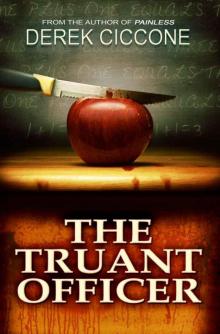 The Truant Officer v5
The Truant Officer v5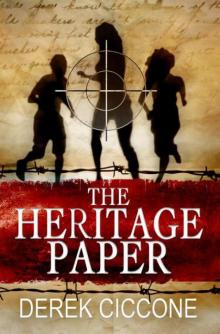 The Heritage Paper
The Heritage Paper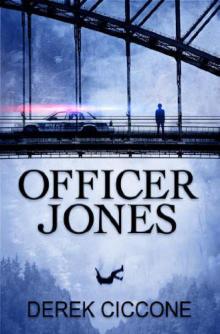 (2012) Officer Jones
(2012) Officer Jones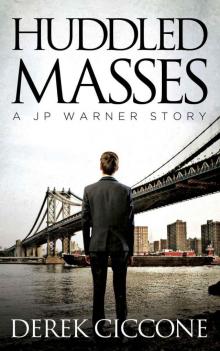 Huddled Masses (JP Warner Book 2)
Huddled Masses (JP Warner Book 2)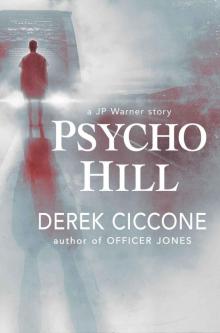 Psycho Hill (JP Warner Book 3)
Psycho Hill (JP Warner Book 3)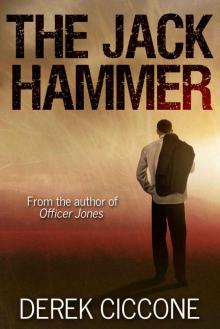 The Jack Hammer
The Jack Hammer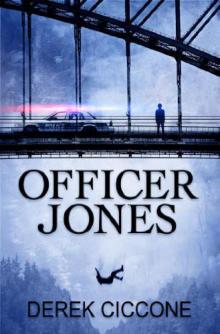 Officer Jones
Officer Jones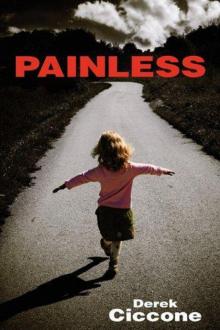 Painless
Painless